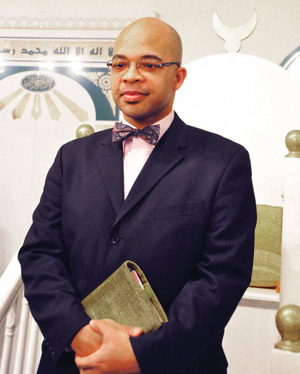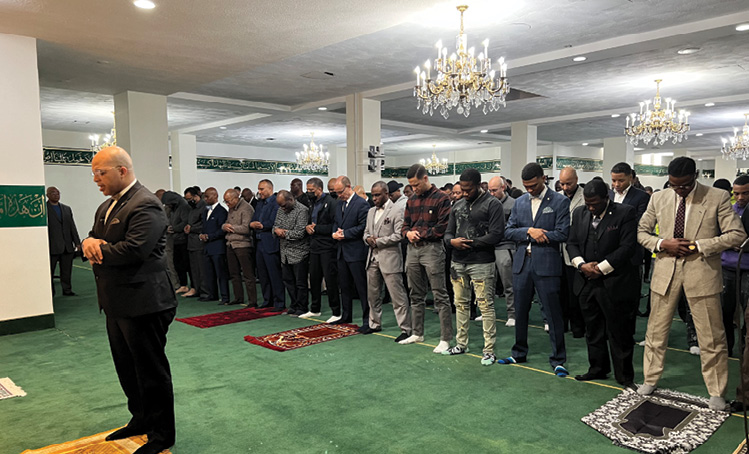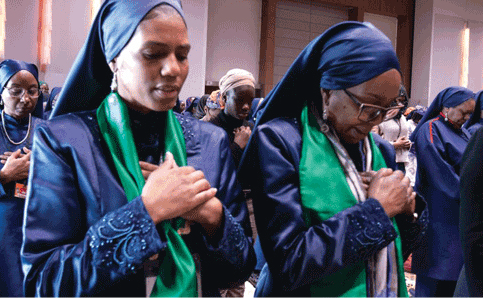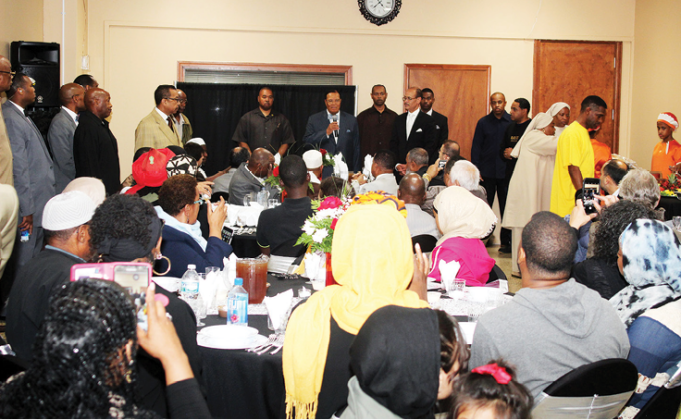“Allah (God) desires ease for you, and He desires not hardship for you, and (He desires) that you should complete the number (of days of the fast of Ramadan).”—Holy Qur’an 2:185

We have been blessed to meet the Holy Month of Ramadan once again and have now entered the last 10 Days and we are more than halfway through the completion of our fasting. These are the “Days of Freedom From Hellfire.”
At this benchmark, we remind ourselves, that one of two things are happening: we are either giving up and cutting corners in our observance of the Great Fast’s guidelines or we are in a spiritual stride, as we come closer to Allah (God) as we continue the Month’s Fast.
The Honorable Minister Louis Farrakhan encourages, “So all of the new Believers: It may be hard for you, but set your mind, set your will. Because once you do it one day, you can do it two; if you do it two, you can do it three, if you do it three, you can do it for 30 days.
Let us make up our minds, and make this a great, great fast. And if you stumble, don’t be hard on yourself. Put it down on your calendar: ‘I am going to make it up in a like number of other days.’”
If we find ourselves cutting corners, let us be reminded that fasting is a medicine or prescription that has been ordained upon us that may have a bitter taste to the ego, if we are engaged in it as a show of self-righteousness, ritual, and attempt to fast when we have a valid exemption.
If we are not improving our character through acts of kindness and devotion, through service and justice toward one another, we are missing the true reward of our effort.
“Fasting is prescribed for you, as it was prescribed for those before you, so that you may guard against evil.”—Holy Qur’an, 2:183
Allah (God) does not want to punish us through hardship, He wants to cure us of the disease of our hearts and purify us. Do we not want what Allah (God) desires for us? The Master Doctor, Allah (God), has given us guidelines for fasting that we sometimes choose to ignore out of our own egoistic ways, neglect, or weaknesses.

We sometimes try to make easy what is to be a trial and we try to make hard what Allah (God) desires to be easy. We must remember the principle lessons to be learned from the prescribed fast is submission to the desire of Allah (God), to be thankful for what we have been blessed with of his provisions, and to stay on guard through God-consciousness (taqwa) from evil by vigilantly walking our post of “self-analysis” in a perfect manner keeping always on the alert through spiritual purification!
In “How to Eat to Live Book II” on page 55, the Honorable Elijah Muhammad writes, “It [Ramadan] is prescribed for us in the Law of the religion of Islam (Holy Qur’an). All Muslims who respect fasting should take the fast of Ramadan.” In the Holy Qur’an, Chapter 2 verses 183-185, Allah (God) establishes the guidelines of fasting. Allah (God), Most High, has given Merciful guidelines in the law of Islam.

Mosque Maryam in Chicago.
Allah (God) commands us to fast during the Month of Ramadan, “for a certain number of days” saying, “(He desires) that you should complete the number” of days in the fast and Mercifully instructs “whoever among you is sick or on a journey he shall fast a like number of other days.
And those who find it extremely hard may effect redemption by feeding a poor man. So, whoever does good spontaneously it is better for him and that you fast is better for you, if you knew.”
Let us become familiar with the practice and apply it to the best of our ability with sincerity but not be extreme in our observance to the detriment of our health if we have medical limitations. We are reminded by these verses that we must not apply our own ideas that suit our own desires and attempt to undermine the Guidance Allah (God) has given us.
Allah (God) has advised us to break the fast when on a journey, however, some of us push and continue the fast anyway. Why are we denying the gifts that Allah (God) has given us? The fast is not to be hard on us! We at times have an — “I got this” attitude but this is our ego speaking.
Let us take the opportunities for blessings by “feeding a poor man” that Allah has given to us through exemptions in breaking the fast. The Guidelines are a Teaching and a means for us to establish Freedom, Justice, and Equality, and destroy the ego of “self,” while meeting the need to address the injustice of poverty.
Are we going to fast anyway while traveling because we feel we have the strength to do it and then deny a person in need the food that Allah (God) has ordered us to feed while we are excused from the fast?

If we are sick let us take a break. We get colds and fall ill; some have medical conditions and if we fast it could make our conditions worse. Do we disregard the advice of God and stubbornly push on to our physical detriment? What is the expiation?
The devotion of fasting and sacrifice at times when we are excused from the fast is expressed through Allah’s (God’s) Guidance by feeding the hungry or by making up the days missed at another time “a like number of days” within the year before the next Month of Ramadan.
Look at the Freedom, Justice, and Equality embedded in the observance of the fast. Let us take these breaks if we are on a journey, if we are sick, and let us take these breaks in fasting if we are too ill or find ourselves having difficulty enduring and engaging in deeper self-analysis, self-correction, and acts of kindness.
In “How to Eat to Live” Book 2, on page 90, the Most Honorable Elijah Muhammad writes, “Do not take fasts while you are breast-feeding an infant or even while you are pregnant.
If you like, you may eat once a day while pregnant or breast-feeding your baby, but you are not forced to do so.” Sisters that are pregnant or nursing are excused from fasting and women during menstruation.
Let us at this time break the fast and not put a hardship on ourselves during these times. Sisters during this time should not feel that their devotion is diminished and not deny the gift of Allah (God) or put undue hardship on ourselves or place the health of our unborn children at risk.
The Prophet Muhammad (PBUH) in regard to not breaking the fast when Allah (God) has excused one—whether male or female—has said, “Is any of you pleased if he gives a gift of charity and it is returned?” Therefore, it is considered a spiritually rude act or ingratitude for the servant to reject the gift or charity from Allah (God) of ease from Allah (God).
Do not put your child who is too young, even not yet born through a fast—this is an undue hardship. Young children under the age of puberty, male or female, are also excused from the fast. Do not allow them, even though they may want to join in with you to take on a fast that will make them ill.
However, we may find creative ways to teach them the lessons of fasting by allowing them to fast a portion of the day or learn restraint by fasting from video games, candy, and engaging in deeper study of our faith.
When we are acting in righteous ways to balance our fasting by not falling into ritualism or any extremes by ignoring valid excuses to break our fast, we enjoy the rich and diverse ways of devotion, through which we learn the lessons of the Month of Ramadan.
We are enjoined and obligated to maintain the spirit of the fast. If we have fallen to weakness there is a necessity for atonement for the fault committed of purposefully breaking our Fast by just giving up with the attitude, “I’m just not going to fast today” without reason.

This is a time to get our “self,” our low desires of the self (nafs), under control. Some of us are unable to make it through the fast not only due to our inability or unwillingness to control our sexual inclination, thirst, and hunger.
If we have broken the fast due to a valid exemption we are to meet the needs of our communities by feeding the hungry and destitute for each day missed with the equivalent amount of food or the average cost of a meal that we would eat for each day missed (fidyah), if way cannot make up a like number of days of the fast due to valid conditions that would prevent us from fasting at any time.
If we have broken the fast purposefully, because we simply cannot control ourselves, then we are to fast for two consecutive lunar months (60 days) for each day, as atonement for disregarding the Commandment of Allah (God) or distribute 60 meals for each day (kaffarah) deliberately missed without valid exemption.
How else do we make up for such weaknesses? By freeing a slave! We must bring one to the Knowledge of Self by actively working to raise the human family from mental, and spiritual death or literally free one from modern slavery, human trafficking, or the like, which are on the rise in the world today.
What is freeing the slave? It is to loosen the “neck” (raqabah) from the bondage of ignorance by instilling in one the knowledge of self. “Or to feed in a day of hunger an orphan nearly related, Or the poor man lying in the dust.”—Holy Qur’an, 90:13-16
We must see that Allah (God), even in circumstances of intentional fault, has given us a means of atonement and does not want hardship for us. If your finances cannot handle it, we must give all that we can of “self” in the First Work of Resurrection of the dead, and charity to seek forgiveness through the advancement of the life-giving Teachings of Freedom, Justice, and Equality (Islam).
Let us free ourselves from the burden of sin and our people from the slavery of the injustice of ignorance, poverty, want, and oppression!
The Honorable Minister Louis Farrakhan teaches us, “In Islam, fasting is an institution of the improvement of the moral and spiritual condition of human beings. Fasting, abstention from food in obedience to Allah (God), helps us build the will to resist the impediments to self–development.
Fasting in the right spirit helps us display repentance. We must be of humble spirit that we may show Allah (God) that we are sick (sorry) over all that we have done to offend Him.”
Imam Sultan Rahman Muhammad is a great-grandson of the Honorable Elijah Muhammad and serves as the Student National Imam of the Nation of Islam at Mosque Maryam, The National Center. Contact via social media @ImamSultanM or email at [email protected].













